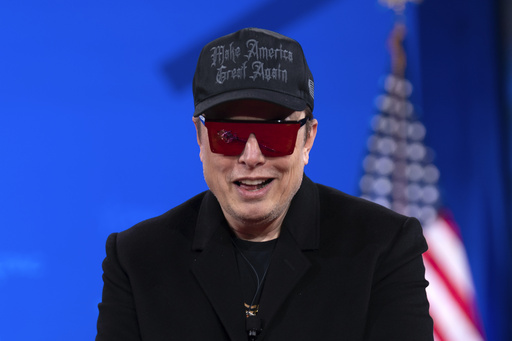
WASHINGTON — President Donald Trump is quickly and forcefully altering the traditional frameworks of American governance and international relations, often relishing in the title of “king.”
The rapid pace of his actions makes it difficult for observers to keep track. One moment he is pursuing interests like acquiring Greenland or shifting U.S. foreign policy in unprecedented ways, the next he is firing a multitude of federal employees, only to rehire some shortly afterward. His approach raises questions about his adherence to laws he finds inconvenient and creates confusion with abrupt changes to the objectives of various federal agencies. Trump’s declaration that there are only two genders, reflecting in new federal documentation, is just one of many impactful decisions. The imposition of tariffs followed by their suspension, only for new tariffs to be introduced, exemplifies the volatile nature of his administration.
Supporters of Trump view these changes positively, while his detractors respond with alarm. The country currently lacks a unifying vision of what defines greatness or potential decline.
What’s clear is that Trump’s administration has initiated one of the most significant shifts in U.S. policy and direction since Franklin D. Roosevelt’s New Deal during the Great Depression. The lasting effects of this transformation and the legacy he will leave behind remains uncertain.
Steve Bannon, a notable figure in the “Make America Great Again” movement, refers to this approach as “muzzle velocity,” suggesting it overwhelms the opposition. This onslaught of policy changes has left foreign leaders and countless public servants in disarray.
Paul Light, an authority on governmental operations, likens the situation to an endless eruption, describing it as a volcanic activity that is both relentless and intense. Max Stier, head of the Partnership for Public Service, compares the atmosphere within the administration to playing Russian roulette, suggesting an uncertain future as the administration introduces more turbulence.
Kevin Roberts from the Heritage Foundation proposes another perspective, calling it a “controlled burn” aimed at clearing out inefficiencies from Washington, which he believes is beneficial for the future. This was reflected in the recommendations put forth by Project 2025, a strategy designed for Trump’s agenda. Around 75,000 federal employees have accepted a “deferred resignation” offer for financial compensation, leading to tens of thousands more being laid off from a federal workforce of approximately 2.4 million.
As the minority party in Congress, Democrats are assessing which battles to pursue amidst the overwhelming number of changes. Representative Jake Auchincloss, a Democrat from Massachusetts, noted that they won’t engage in what he termed the “outrage Olympics.” Meanwhile, polling indicates that just under half of U.S. adults approve of Trump’s job performance, which is slightly better than Joe Biden’s final approval ratings. These numbers are fluid and could quickly change with new developments.
In the realm of foreign relations, Trump rapidly altered U.S. policy, notably approaching Russia and scaling back support for NATO allies while also cutting foreign aid significantly. Conversely, Ukraine—historically a close ally—has found itself criticized by the U.S. under Trump’s direction.
Domestically, the torrent of executive orders has reshaped not only the federal operations but also cultural standards. Corporate entities, along with government agencies, are distancing themselves from diversity and inclusion initiatives. Trump’s efforts to enforce new regulations concerning gender identity are also drawing significant opposition in court. The legal system is becoming the last barrier against Trump’s expansive executive power, which has mostly gone unchecked by a supportive Republican Congress.
Senator John Kennedy of Louisiana has remarked on the overwhelming number of executive orders Trump has issued, highlighting the difficulty in even keeping up with the pace of change. Traditional Republican values, such as advocating for free trade and maintaining robust security commitments, seem to be overshadowed by the current climate.
The administration recently reversed local governance decisions, such as blocking New York City’s commuter tolls, demonstrating a hands-on federal approach that contradicts historical Republican philosophy. Trump acknowledged this move with a playful claim, “Long live the king,” complete with a crown image circulated by the White House.
In the shakeup of the civil service, Trump has influenced a substantial reduction in staff, often targeting newer employees while also dismissing senior officials deemed unsupportive. Key roles, including those responsible for maintaining agency integrity, have undergone significant turnover. The abrupt firing of nearly 20 departmental inspectors general was a shocking decision, as was the removal of the government’s chief ethics officer, which the Supreme Court temporarily halted.
Congress continues to grant the president substantial financial authority, which is actively being exercised without much oversight regarding spending cuts or freezes on approved activities. As a constitutional expert pointed out, this past month has been uniquely significant in American history, marking a period where presidential actions greatly challenge established legal frameworks.
Historically, such upheaval typically arose in times of great national crisis, but there is no equivalent is seen here. Even as illegal border crossings normalized as Biden prepared to exit office, Trump unleashed the aggressive measures he hinted at during his campaign.
For Trump and inventor Elon Musk, the pressing issue seems to be the entrenched bureaucracy that they believe opposes the duly elected power. Musk recently insisted that if the president’s will is obstructed, it implies a misalignment with democracy, underscoring that the federal workforce must adjust to reflect the collective will of the citizens.
Experts suggest that while the current climate yields certain necessary corrections, the overwhelming chaos is both intentional and detrimental. It may weaken the government’s responsiveness in times of crisis, exposing vulnerabilities like unpreparedness for national emergencies.
Recent polling shows troubling signs for Trump: a significant portion of the population feels he has exceeded his authority, with others expressing that he does not prioritize urgent national issues. The nation appears sharply divided in its sentiments about Trump, with opinions about his actions deeply polarized depending on one’s perspective.

